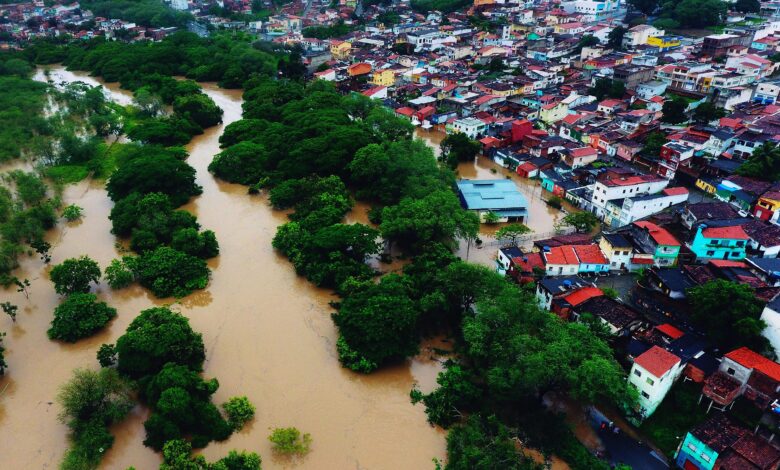Deadly floods wreak havoc in Brazil leaving thousands of people stranded
At least 39 people have lost their lives, and another 68 are reported missing, according to the state civil defence agency

Severe flooding and heavy rains have wreaked havoc in southern Brazil, leaving a track of destruction and displacing tens of thousands of people from their homes. The endless rainfall has resulted in tragic loss of life, with dozens reported dead and many others still missing. Cities such as Porto Alegre have been severely impacted, facing rising floodwaters and widespread destruction. Despite ongoing rescue efforts, the magnitude of the disaster remains overwhelming.
Heavy rainfall and flooding have caused widespread devastation in southern Brazil, particularly in the state of Rio Grande do Sul. The situation is critical, with thousands of people forced to leave their homes as floodwaters continue to rise. At least 39 people have lost their lives, and another 68 are reported missing, according to the state civil defence agency.
The floods have surpassed previous records, with water levels reaching their highest in decades. Entire cities, including Porto Alegre, the capital of Rio Grande does Sul, have been seriously affected. Roads have been washed away, bridges have collapsed, and essential services such as electricity, communications, and water supply have been disrupted.
The outcome of the floods extends beyond the loss of life and property damage. Thousands of residents are abandoned without access to food, clean water, or medical assistance. Many have been forced to seek refuge in makeshift shelters set up in sports centres and schools. The situation is particularly dire in Porto Alegre, where the Guaiba River has reached historic highs.
The city’s infrastructure is under immense strain, with authorities struggling to cope with the scale of the disaster. Entire neighbourhoods are underwater, and residents are facing chaotic conditions as they try to navigate the floodwaters.
Moreover the immediate dangers posed by the flooding, there are concerns about long-term environmental impacts. The heavy rains have caused landslides and mudslides, further exacerbating the damage. The destruction of forests and vegetation could lead to soil erosion and other ecological problems in the future.
The floods have also highlighted the vulnerability of communities in the face of climate change. Scientists have warned that extreme weather events like this are likely to become more frequent and severe as global temperatures continue to rise. Urgent action is needed to address the root causes of climate change and mitigate its impact on vulnerable populations.
In response to the crisis, government agencies and emergency responders are working around the clock to provide assistance to those affected. Rescue operations are underway to evacuate stranded residents and deliver essential supplies to areas cut off by the floods. However, the scale of the disaster means that resources are stretched thin, and more support is needed.
As communities come together to rebuild and recover, it is essential that lessons are learned from this disaster to better prepare for future emergencies. Only through collective action and sustainable solutions can we hope to build resilient communities and safeguard the lives and livelihoods of those most at risk.



